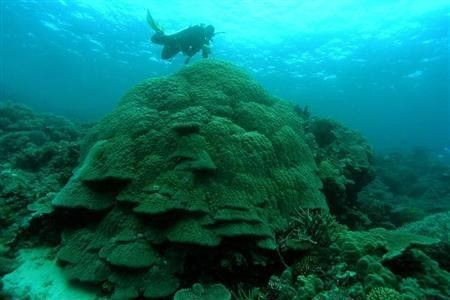Study: Corals need balanced diet to stay resilient during climate change

In a recent report, the Australian government said that progress to improve water quality on the Great Barrier Reef has slowed dramatically in 2013 to 2014. Inshore coral reefs, in particular, were reported to remain in poor condition, although there were modest improvements in juvenile coral density.
A new study, published in the journal Limnology and Oceanography, suggests that corals need a nutrient-rich and balanced diet in order to stay in good condition, especially during stressful thermal events. Scientists at the University of Miami’s Rosenstiel School of Marine and Atmospheric Science and the Centre Scientifique de Monaco claim that the particular nutrient balance in seawater benefits corals the most.
“We found that the coral’s resilience to thermal stress totally depends on the kind of inorganic enrichment – if it’s ‘balanced’ or not,” says Erica Towle, one of the researchers and an alumna of the UM Rosenstiel School.
For the study, the research team collected specimens of the yellow scroll coral, Turbinaria reniformis, from the Red Sea. To find out which nutrients are more beneficial to corals during elevated temperature conditions, the scientists fed the corals inorganic nutrients of nitrogen and phosphorus commonly found in the ocean as a result of fertilisers and sewage runoff, as well as organic nutrients of zooplankton, tiny animals in the ocean that coral are known to feed on.
The scientists placed the specimens in separate seawater tanks with varying temperature – 25 degrees Celsius to represent normal temperature conditions and 30 degrees Celsius to represent thermal stress conditions. After the laboratory experiment, all of the corals were then returned to normal temperature conditions to examine their recovery.
Based on the study’s results, the researchers note that excess nitrogen alone and zooplankton made high-temperature bleaching events worse. Excess nitrogen, combined with extra phosphorus and zooplankton, meanwhile, afford the coral resilience to bleaching. This study is among the first to assess the three-way interaction between the two types of nutrient enrichment and thermal stress on coral health.
In 2015, the research team published a study showing that the critically endangered Staghorn coral may benefit from supplemental nutrition to mitigate the adverse impacts of global climate change. The results revealed that temperature, carbon dioxide, or CO2, and feeding had significant effects on the coral's growth rate. It was the first study to document that an endangered coral species can buffer the effects of increased CO2 in the ocean by increasing feeding rates.
According to Towle, it is important to assess excess nutrients from land sources and thermal stress together, as they will likely occur more in the future. As global ocean temperatures rise, incorporating nutrient levels in thermal bleaching models will likely be very important for coral reef management in the future, she says.
Contact the writer at feedback@ibtimes.com.au or tell us what you think below.





















